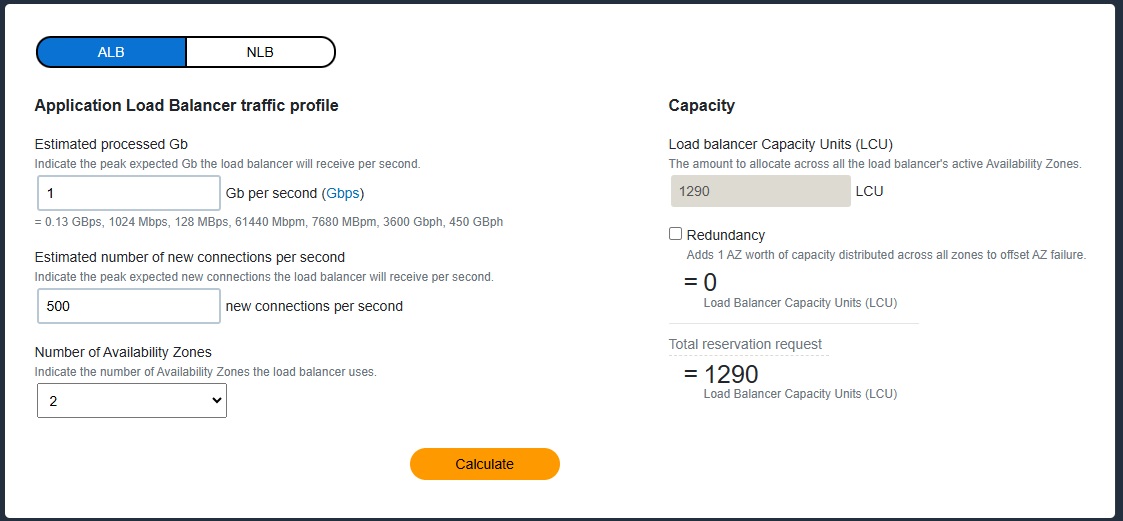Introduction
AWS Load Balancer Capacity Unit Reservations offer a solution for businesses that need predictable and consistent performance from their Application Load Balancers (ALBs). By reserving a specific number of Load Balancer Capacity Units (LCUs), companies can secure the resources they need for steady or expected traffic patterns, ensuring their applications run smoothly even during high-demand periods. This feature simplifies scaling and cost management, providing enhanced reliability and cost efficiency.
What Are AWS Load Balancer Capacity Unit Reservations?
AWS Load Balancer Capacity Unit Reservations allow organizations to pre-allocate a certain number of LCUs to guarantee consistent performance across their ALBs. This feature is particularly useful for applications with predictable, steady traffic, as it helps businesses avoid performance issues during periods of high demand.
LCUs are a metric used to measure your ALB usage in AWS. They account for:
- Processed Bytes: Total data handled by the ALB.
- New Connections Per Second: Number of new connections established every second.
- Active Connections Per Minute: Number of connections sustained per minute.
By reserving AWS Load Balancer Capacity Units, businesses can lock in a specific number of LCUs, ensuring their application load balancers perform optimally during peak times, without facing unexpected cost spikes from over-provisioning.
Benefits of AWS Load Balancer Capacity Unit Reservations
Predictable Performance
Securing the right number of LCUs through reservations ensures your application consistently performs well during high-demand periods, like seasonal sales or major traffic events.Cost Efficiency
AWS Load Balancer Capacity Unit Reservations enable you to budget for your ALB capacity in advance, eliminating the surprise of additional charges due to fluctuating on-demand usage. This makes it easier to manage long-term costs.Seamless Scalability
With reserved capacity, you can handle surges in traffic without worrying about scaling or over-provisioning. This allows you to focus on optimizing application delivery rather than resource allocation.Better Traffic Management
By reserving the right amount of capacity, businesses can avoid bottlenecks and ensure smooth, uninterrupted service even during high usage.
How to Use AWS Load Balancer Capacity Unit Reservations
To get started with AWS Load Balancer Capacity Unit Reservations, follow these simple steps:
Estimate Your Needs
Begin by assessing your application’s traffic requirements. You can use tools like the AWS Load Balancer Capacity Reservation Calculator to help estimate the number of LCUs your application will need. This tool factors in your average traffic and helps ensure you reserve the appropriate amount of capacity.

Reserve Capacity in the AWS Console
Once you’ve determined your LCU requirements, log in to the AWS Management Console and navigate to your ALB settings. You’ll find options to configure the number of LCUs you want to reserve. Simply select the appropriate settings for your use case.Monitor and Adjust as Needed
AWS provides monitoring tools such as CloudWatch to help you track your actual usage against your reservations. If your traffic patterns change over time, you can adjust your reservations to align with your evolving needs.
Use Cases for AWS Load Balancer Capacity Unit Reservations
E-Commerce Websites
During high-traffic events like Black Friday or holiday sales, AWS Load Balancer Capacity Unit Reservations help ensure that your website can handle the increased number of user connections without crashing or experiencing delays.Streaming Services
Services like video streaming can also benefit from LCU reservations, particularly when expecting higher usage due to new content releases or special events. By reserving the necessary LCUs, companies can guarantee high-quality, uninterrupted service for all viewers.Corporate Applications
Internal applications, such as intranet systems or enterprise software, can rely on LCU reservations to maintain performance during peak work hours or during software rollouts.
Using the Capacity Reservation Calculator
To make the most of your AWS Load Balancer Capacity Unit Reservations, it’s important to accurately estimate your traffic needs. The AWS Load Balancer Capacity Reservation Calculator is a handy tool that helps businesses calculate the required number of LCUs based on factors such as traffic volume, connections per second, and data processed. This ensures you reserve just the right amount of capacity, saving costs while guaranteeing performance.
Conclusion
AWS Load Balancer Capacity Unit Reservations provide a robust solution for businesses looking to optimize performance and control costs for their Application Load Balancers. With features like predictable pricing, guaranteed availability, and seamless scaling, this tool helps businesses manage high traffic loads efficiently.
If you want to learn more about how to implement AWS Load Balancer Capacity Unit Reservations or need guidance on estimating your LCU needs, feel free to reach out to us. Our team is here to assist you in optimizing your AWS resources for better performance and cost efficiency.
Frequently Asked Questions (FAQs) on AWS Load Balancer Capacity Unit (LCU) Reservations
1. What are AWS Load Balancer Capacity Unit (LCU) Reservations?
AWS Load Balancer Capacity Unit (LCU) Reservations allow you to pre-allocate load balancing capacity for your Application Load Balancers (ALBs), helping ensure predictable performance and cost management.
Each reservation secures a defined number of Load Balancer Capacity Units (LCUs) — the metric AWS uses to measure ALB usage based on the following dimensions:
- New connections – The number of newly established connections per second. Typically, many requests are sent per connection.
- Active connections – The number of active connections per minute.
- Processed bytes – The total number of bytes processed by the load balancer in GBs for HTTP(S) requests and responses.
- Rule evaluations – Calculated as the product of the number of rules processed by your load balancer and the request rate. The first 10 rules per request are free.
Formula: Rule evaluations = Request rate × (Number of rules processed – 10 free rules)
By reserving LCUs, organizations can:
- Ensure predictable ALB performance during steady or high-demand traffic.
- Avoid unexpected cost fluctuations due to variable usage.
- Plan capacity efficiently for applications that require consistent or growing load balancing throughput.
2. Why did AWS introduce LCU Reservations?
AWS introduced LCU Reservations to help organizations maintain consistent ALB performance and improve cost predictability.
Previously, ALB capacity scaled dynamically, which could cause unexpected cost spikes during high traffic.
With reservations, customers can:
- Lock in capacity for predictable workloads
- Avoid performance degradation
- Simplify AWS cost management
3. How does AWS calculate Load Balancer Capacity Units (LCUs)?
An LCU (Load Balancer Capacity Unit) is AWS’s standard measure for ALB usage. It aggregates three main metrics:
- Processed Bytes – The amount of data handled by your load balancer.
- New Connections per Second – Frequency of new client connections.
- Active Connections per Minute – Sustained concurrent connections.
Your ALB is billed based on the highest usage among these three metrics in a given hour.
4. What are the benefits of reserving Load Balancer Capacity Units?
Key advantages of AWS Load Balancer Capacity Unit Reservations include:
✅ Predictable performance – Guaranteed capacity during traffic surges.
✅ Cost efficiency – Fixed-rate pricing helps control AWS costs.
✅ Seamless scalability – Handle traffic bursts without manual scaling.
✅ Better reliability – Prevents throttling or performance degradation.
These reservations help enterprises optimize both performance and budget planning.
5. How do I estimate the right number of LCUs for my workload?
You can use the AWS Load Balancer Capacity Reservation Calculator to estimate your LCU requirements.
This tool analyzes:
- Average and peak traffic
- Data processed per connection
- Number of requests per second
By entering these values, the calculator provides an accurate estimate of how many LCUs to reserve—ensuring you don’t overpay or under-provision.
6. How do I create Load Balancer Capacity Unit Reservations in AWS?
Here’s how to configure LCU Reservations:
- Log in to the AWS Management Console
- Navigate to the EC2 → Load Balancers → Application Load Balancer section
- Choose Create Reservation or Manage Capacity Units
- Specify the number of LCUs you wish to reserve
- Review and confirm your reservation settings
AWS then guarantees that capacity for your ALBs, ensuring steady performance and predictable billing.
7. How can I monitor and adjust my LCU Reservations?
You can monitor reservation usage with Amazon CloudWatch, which tracks metrics such as:
- Active connections
- Bytes processed
- Reservation utilization
If your application traffic grows or decreases, you can modify your LCU reservations to match current needs, ensuring continuous optimization.
8. What types of workloads benefit most from LCU Reservations?
LCU Reservations are ideal for workloads with steady or predictable traffic, such as:
- E-commerce websites – During seasonal or promotional spikes
- Streaming platforms – When anticipating viewer surges for new releases
- Corporate or internal apps – Ensuring reliable access during work hours
- Gaming or live event apps – Managing user spikes with guaranteed capacity
9. How do LCU Reservations improve AWS cost management?
By reserving LCUs:
- You lock in pricing for a set capacity
- Avoid variable on-demand costs during peak usage
- Gain cost predictability and simplify financial forecasting
This approach aligns with AWS FinOps best practices, helping finance and DevOps teams collaborate on budget-efficient scaling.
10. Can I combine LCU Reservations with other AWS cost optimization tools?
Yes — LCU Reservations can be effectively combined with other AWS cost optimization tools to create a holistic savings strategy across both compute and networking layers.
You can pair LCU Reservations with:
- Savings Plans and Reserved Instances – Optimize compute costs for EC2, Fargate, and Lambda workloads.
- Auto Scaling – Automatically adjust EC2 capacity to match demand and avoid over-provisioning.
- AWS Budgets and Cost Explorer – Monitor spending trends and track cost efficiency over time.
- Amazon CloudWatch Alarms – Track performance metrics and detect anomalies that may impact cost or usage.
By combining these tools, you can achieve end-to-end visibility, automated scaling, and predictable cost savings across your AWS environment.
11. How do LCU Reservations differ from Auto Scaling?
While Auto Scaling adjusts capacity dynamically based on real-time demand, LCU Reservations guarantee a fixed capacity for predictable workloads.
- Auto Scaling = Reactive and flexible, suitable for variable traffic
- LCU Reservations = Proactive and stable, ideal for steady workloads
Many businesses use both together: reservations for baseline capacity, Auto Scaling for unexpected spikes.
12. How does TruCost.Cloud help with AWS Load Balancer optimization?
TruCost.Cloud helps organizations:
- Accurately estimate and right-size their LCU Reservations
- Build FinOps-driven governance models for AWS load balancing
- Integrate CloudWatch monitoring and AWS Budgets for continuous optimization
With deep AWS expertise, TruCost.Cloud ensures you get maximum performance, predictable costs, and scalable infrastructure.










